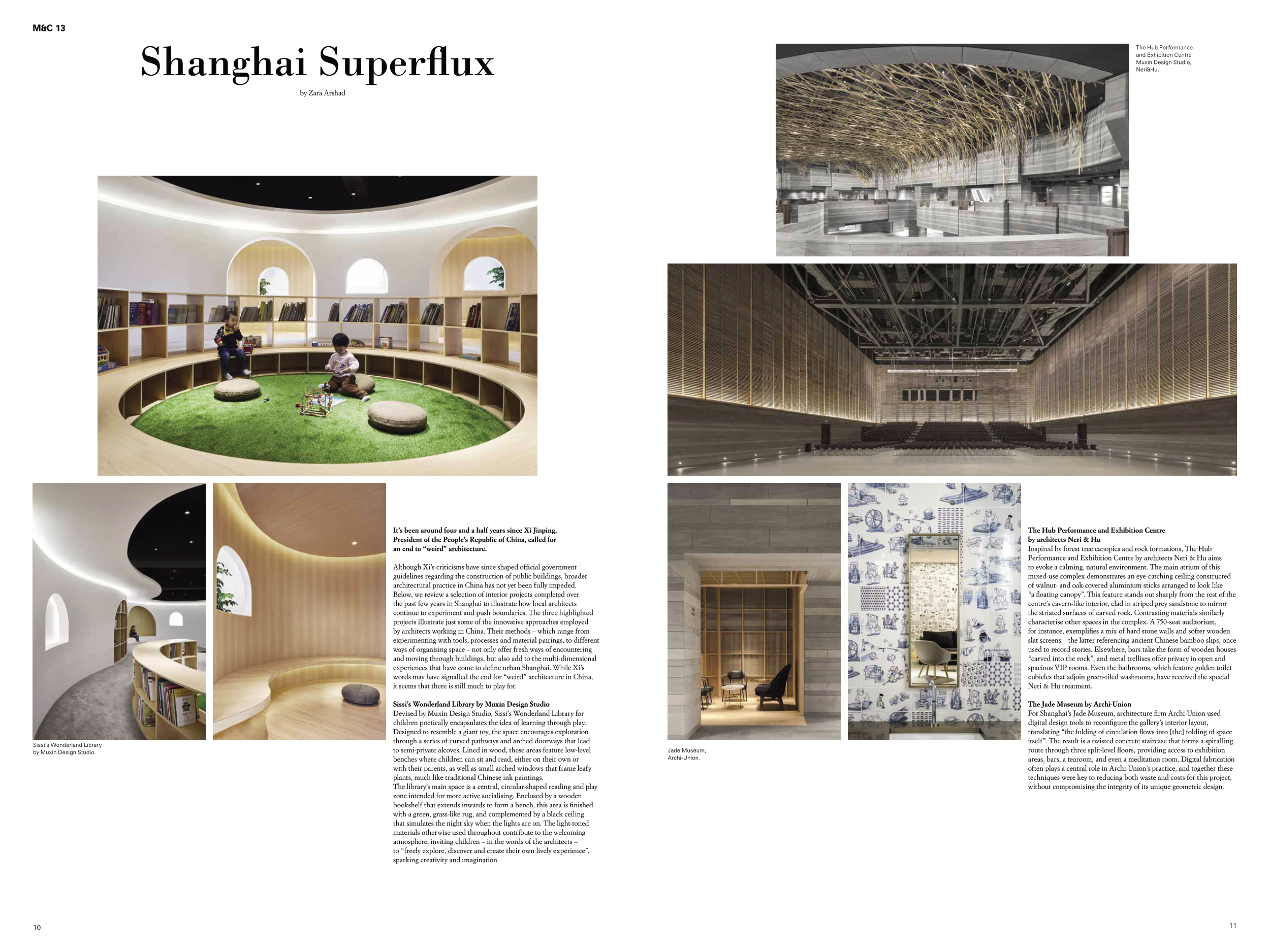10
11
M&C 13
Sissi’s Wonderland Library
by Muxin Design Studio.
The Hub Performance
and Exhibition Centre
Muxin Design Studio,
Neri&Hu.
Jade Museum,
Archi-Union.
Shanghai Superflux
by Zara Arshad
It’s been around four and a half years since Xi Jinping,
President of the People’s Republic of China, called for
an end to “weird” architecture.
Although Xi’s criticisms have since shaped official government
guidelines regarding the construction of public buildings, broader
architectural practice in China has not yet been fully impeded.
Below, we review a selection of interior projects completed over
the past few years in Shanghai to illustrate how local architects
continue to experiment and push boundaries. The three highlighted
projects illustrate just some of the innovative approaches employed
by architects working in China. Their methods – which range from
experimenting with tools, processes and material pairings, to different
ways of organising space – not only offer fresh ways of encountering
and moving through buildings, but also add to the multi-dimensional
experiences that have come to define urban Shanghai. While Xi’s
words may have signalled the end for “weird” architecture in China,
it seems that there is still much to play for.
Sissi’s Wonderland Library by Muxin Design Studio
Devised by Muxin Design Studio, Sissi’s Wonderland Library for
children poetically encapsulates the idea of learning through play.
Designed to resemble a giant toy, the space encourages exploration
through a series of curved pathways and arched doorways that lead
to semi-private alcoves. Lined in wood, these areas feature low-level
benches where children can sit and read, either on their own or
with their parents, as well as small arched windows that frame leafy
plants, much like traditional Chinese ink paintings.
The library’s main space is a central, circular-shaped reading and play
zone intended for more active socialising. Enclosed by a wooden
bookshelf that extends inwards to form a bench, this area is finished
with a green, grass-like rug, and complemented by a black ceiling
that simulates the night sky when the lights are on. The light-toned
materials otherwise used throughout contribute to the welcoming
atmosphere, inviting children – in the words of the architects –
to “freely explore, discover and create their own lively experience”,
sparking creativity and imagination.
The Hub Performance and Exhibition Centre
by architects Neri & Hu
Inspired by forest tree canopies and rock formations, The Hub
Performance and Exhibition Centre by architects Neri & Hu aims
to evoke a calming, natural environment. The main atrium of this
mixed-use complex demonstrates an eye-catching ceiling constructed
of walnut- and oak-covered aluminium sticks arranged to look like
“a floating canopy”. This feature stands out sharply from the rest of the
centre’s cavern-like interior, clad in striped grey sandstone to mirror
the striated surfaces of carved rock. Contrasting materials similarly
characterise other spaces in the complex. A 750-seat auditorium,
for instance, exemplifies a mix of hard stone walls and softer wooden
slat screens – the latter referencing ancient Chinese bamboo slips, once
used to record stories. Elsewhere, bars take the form of wooden houses
“carved into the rock”, and metal trellises offer privacy in open and
spacious VIP rooms. Even the bathrooms, which feature golden toilet
cubicles that adjoin green-tiled washrooms, have received the special
Neri & Hu treatment.
The Jade Museum by Archi-Union
For Shanghai’s Jade Museum, architecture firm Archi-Union used
digital design tools to reconfigure the gallery’s interior layout,
translating “the folding of circulation flows into [the] folding of space
itself”. The result is a twisted concrete staircase that forms a spiralling
route through three split-level floors, providing access to exhibition
areas, bars, a tearoom, and even a meditation room. Digital fabrication
often plays a central role in Archi-Union’s practice, and together these
techniques were key to reducing both waste and costs for this project,
without compromising the integrity of its unique geometric design.


